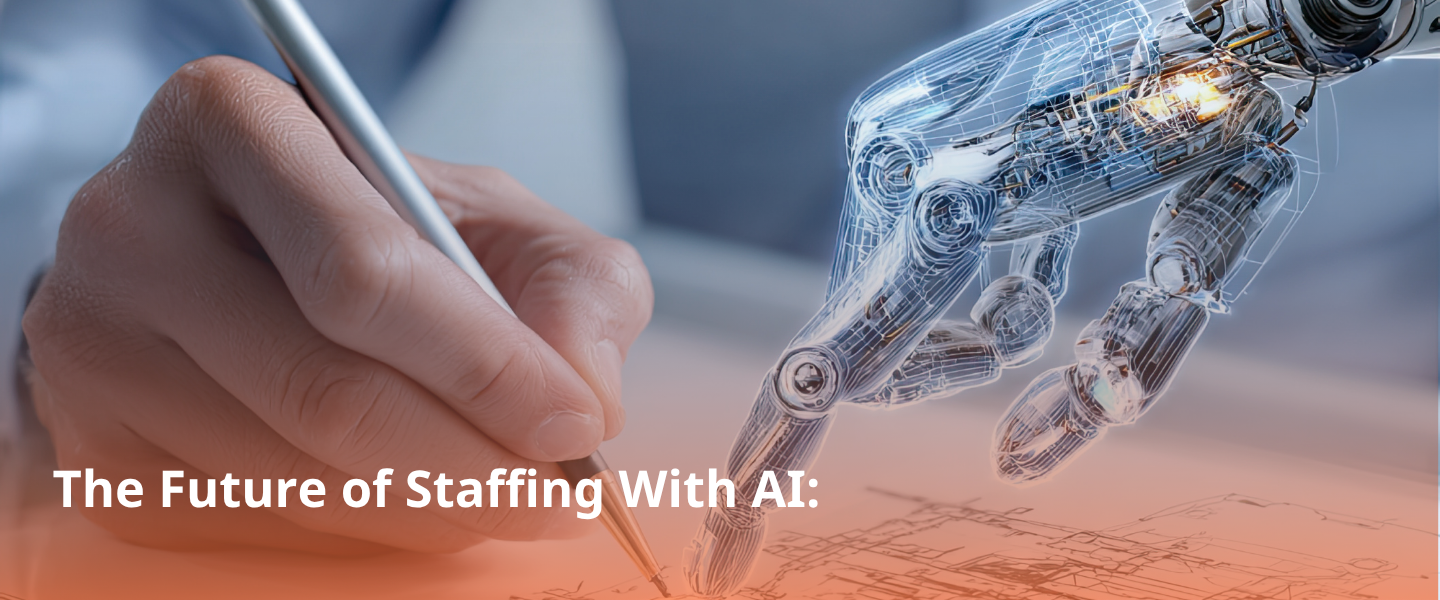The Future of Staffing With AI: Insights From Industry Leaders
October 2, 2025
October 2, 2025

October 2, 2025
October 2, 2025

Artificial intelligence is transforming the way the staffing industry operates, shifting from a tool that businesses experimented with to an integral part of the recruiting process. In fact, at the start of 2025, 72% of HR professionals had implemented AI in their hiring, a big leap from 58% in 2024. And the adoption rate keeps growing.
Staffing firms are currently using AI for resume screening, candidate matching, communication automation, and more, but while adoption brings opportunity, it also introduces challenges and questions.
In our recent webinar, “Faster. Smarter. Still Human: The Future of Staffing With AI,” we spoke with industry leaders Greg Frick, President and CEO of Qualified Recruiter, and Sarvesh Sharma, AVP of Sibitalent Corp, who shared their perspectives on how AI is reshaping recruitment, where it adds the most value, and how firms can use it responsibly. The session also touched on the challenges of adoption and emphasized that the technology should enable rather than replace human recruiters.
AI in staffing started with simple tasks like drafting emails but has quickly expanded into sourcing, candidate screening, and even automated interviews.
AI tools significantly improve candidate identification by matching qualified talent to job requirements, enabling recruiters to quickly reach out to appropriate candidates once the system identifies suitable matches. The participants discussed how these tools enhance efficiency but also require human oversight. AI is very efficient at identifying good candidates. It can quickly match resumes to jobs, but only if your database is up to date.
Greg noted that data quality is crucial for AI effectiveness, as matching capabilities are only as good as the underlying information.
One of the clearest benefits of AI is reduction of repetitive work for recruiters. Removing the repetitive work speeds up the process, with much faster screening and matching being the one of the bigger gains people are seeing. From matching resumes to jobs to generating interview questions, AI helps recruiters to focus on higher-value tasks.
Greg pointed out that AI helps to get a candidate in front of a recruiter and talking to a human faster, ultimately reducing time-to-hire significantly.
Sarvesh emphasized that adoption of AI tools is happening faster than expected and believes that it will “improve the experience from the recruitment side as well as from the candidate side.”
Agentic AI is now being used to automate outreach, interview scheduling, and resume screening. While still in early stages, these tools show strong potential to streamline workloads. The discussion emphasized that AI agents should be viewed as extensions of human recruiters rather than replacements, with humans driving the technology and integrating agents into their workflows
Recruiters remain essential in the hiring process as they verify resume authenticity by cross-referencing with LinkedIn profiles and other platforms to validate candidate information and skills. Greg stressed the continuing importance of the human role, noting that agents don't replace humans but make the workload easier, enabling people to do a better job.
Recruiting needs to be personal, and AI should enhance, not replace, the human connection at the heart of staffing. The discussion highlighted how AI narrows the initial candidate pool, then recruiters further refine the selection to the final candidates for submission, creating an effective human-AI collaboration workflow.
With any new technology, questions of ethics and responsibility are front and center. Both leaders underscored the need for training recruiters on how to use AI tools effectively to head off any chance of unethical use.
Greg warned against complacency and an over-reliance on AI. “The biggest risk is laziness; relying entirely on AI leads to poor quality," he said. "The AI is not going to negotiate salary with the candidate. That’s where the recruiter comes in.”
Sarvesh added that AI can reduce bias by focusing on skills, but recruiters must still validate profiles and ensure fairness throughout the hiring process.
The session wrapped up with discussion about data privacy and maintaining transparency about AI usage.
What does the future hold for AI in staffing? Both speakers are looking forward to the day when AI is a true assistant to the recruiter, advanced enough to work simultaneously with a recruiter, say in an interview situation where it could provide prompts or follow-up questions and empower recruiters to ask expert questions in fields they are not experts in.
They both recommended starting small with practical use cases like sourcing and top-of-funnel screening, where AI can quickly add value.
Greg and Sarvesh are optimistic about the potential of AI in staffing and agree that future success lies not in replacing recruiters but in empowering them. The path forward is clear: staffing firms that combine AI’s efficiency with human expertise will be best positioned to thrive in an evolving market.
Missed the webinar? Watch the full recording on-demand here.